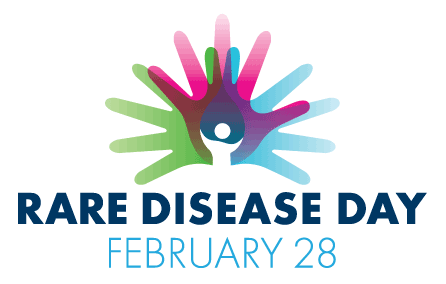Did you know 1 in 10 people in America have a Rare Disease? Individually, Rare Diseases are scarce, but together they are actually quite common with 30 million Americans having a Rare Disease. More than half of those living with a Rare Disease are children…and about 30% of these children will not live to see their 5th birthday (NIH).

February hosts the rarest day of the year 2/29, which is celebrated as Rare Disease Day worldwide. Since this year wasn’t a leap year, Rare Disease Day was celebrated on the 28th, and February was celebrated as Rare Disease Month.
Events sponsored by NORD, the National Organization for Rare Disorders, are held throughout the world. These events target legislators, legislative staff, the public and the media in an effort to raise awareness of the needs of the rare disease community. It is vital to educate our state legislators about the many challenges that the rare disease community faces because important decisions related to rare diseases are made at the state level.
An event was held at the Connecticut State House on Rare Disease Day itself this year, February 28th. There were a variety of speakers present, including people with rare diseases, legislators, researchers, caregivers and advocates. This year there were representatives from Alexion Pharmaceuticals, Connecticut Children’s Medical Center, UCONN, and Yale.
Vanessa Proctor, the Executive Director of Global Governmental Affairs at Alexion, spoke about the global pharmaceutical company’s focus of bringing therapy to market for rare diseases. Professor David Goldhamer, Associate Director of the UCONN Stem Cell Institute, shared about his research on Fibrodysplasia Ossificans Progressive (FOP). His team is using mouse models that carry the same mutation as over 90% of FOP patients.
Patient advocates, researchers and people afflicted by glycogen storage disorders (GSD) shared their inspiring, ongoing journey of finding a cure. Gayle Temkin is the Founder of Alyssa’s Angels Fund and mother of Alyssa, who has a GSD. She recounted when Dr. David Weinstein sat in her living room talking about how close he was to a cure. She asked him to move from Florida to Connecticut to finish his work; and his team did just that to start the GSD Program at Connecticut Children’s Medical Center. They have since treated patients from 45 states and 45 countries.
 Maddison Shaw, Maddie’s Herd, leading the young patients panel
Maddison Shaw, Maddie’s Herd, leading the young patients panel
Maddison Shaw, Founder of Maddie’s Herd, mediated a panel of other kids with rare diseases, sharing what disease they had, how it effects their life and what they like to do for fun. Kids spoke of how doctors, researchers and caregivers have changed their lives and how they want to and are already making their voices heard in the community.
Dr. Mustafa Kokhura, of Yale Genetics, focused on the importance of utilizing exome sequencing to identify the mutations causing these rare diseases. By finding mutations, more tailored treatments can be developed for patients. “Connecticut is the perfect place to do this” she shared, “we can transform rare disease research here.”
The event had an overall focus on Connecticut’s potential to become an even larger, leading force in the fight for rare diseases. “Connecticut can be a national leader,” Fran Reed, CureGSD elaborated on the importance of support on the state level to reach this goal, “a few legislators standing up can change the world.” Which is why he and many others urge you, the public, to contact your senators in support of Bill HB6009, An Act to Create a Permanent Rare Disease Advisory Council, to make an impact.
To spread the awareness and support of rare diseases we asked members of the rare diseases community to share what aspect of their rare disease they wanted the people to learn about. Check out the responses below! Want to be featured with a quote about your rare disease? Tweet us @mygenecounsel!

“Condition begins before birth. Child born with defects in kidneys. Kidney can’t absorb sodium & potassium. Electrolyte wasting.” ~Bartter Syndrome (@EthansCure)

“22q11.2 deletion syndrome – probably the most ‘common’ rare disease never heard of.” 22Q11 Ireland @22Q11_Ireland

“People participating in rare research are heroes. Findings benefit EVERYONE, even when treatment for oneself is not guaranteed. #NIH XP/TTD” Janice Hansen @jjturlington

“EDS is a complex condition where the healthiest looking ppl are living with chronic pain, fatigue, organ dysfunctions & so much more.” Nadia, @NadiaBodkin

“We want a genetic diagnosis. 5 years and 2 whole exome tests with no answers.” Sylvie Matthews, @LifeWithStripes

“It’s like a struggle on daily basis, sometimes I don’t know if I feel active today, it will be the same tomorrow or not #PCD” نویرہ ظفر, @no1tweets

“That #brca mutation isn’t the only high risk breast cancer syndrome. That Cowden Syndrome has risk of brain tumors too.” Heather, @ZHeatherChamp

“Ovarian Cancer > No screening test. ~15% of cases caused by BRCA Mutations. Symptoms-bloating, frequent urination, abdominal pain, and feeling full” Kaleidoscope of Hope, @KOH_NJ

“It’s not truly rare, just rarely diagnosed. At least not our most common form hEDS & new subcat #HSD” Oh, That’s Why I’m So Tired!, @H2OhTwist
“It needs to taught about in nursing schools, med schools, and advocated to cancer research and genetic engineering groups. It’s glossed over and often ignored entirely in curriculums. I had signs and symptoms for YEARS before I was finally diagnosed. It’s been a very long, exhausting road, a lot in part because providers weren’t up to speed on the disease process.” ~Chris (via FAPvoice)
How did you support Rare Disease Day this year? Tweet us @mygenecounsel or leave a comment below!

